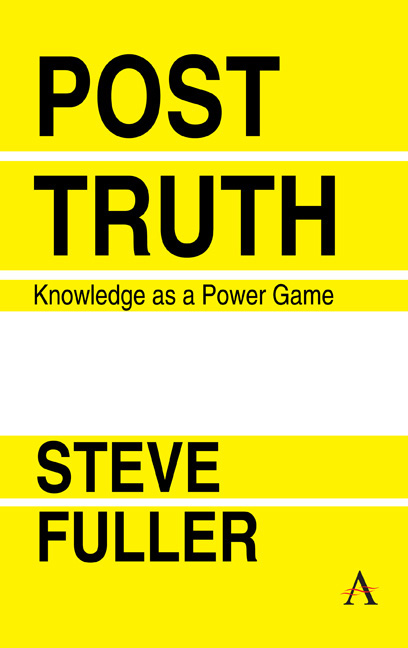Book contents
- Frontmatter
- Dedication
- Contents
- Acknowledgements
- Introduction: Science and Politics in a Post-Truth Era: Pareto's Hidden Hand
- 1 Brexit: Political Expertise Confronts the Will of the People
- 2 What Philosophy Does and Does Not Teach Us about the Post-Truth Condition
- 3 Sociology and Science and Technology Studies as Post-Truth Sciences
- 4 The Post-Truth about Academia: Undiscovered Public Knowledge
- 5 Science Customization: A Project for the Post-Truth Condition
- 6 The Performance of Politics and Science on the Playing Field of Time
- 7 Forecasting: The Future as the Post-Truth Playground
- The Argument in a Nutshell
- Glossary
- References
- Index
6 - The Performance of Politics and Science on the Playing Field of Time
Published online by Cambridge University Press: 14 July 2018
- Frontmatter
- Dedication
- Contents
- Acknowledgements
- Introduction: Science and Politics in a Post-Truth Era: Pareto's Hidden Hand
- 1 Brexit: Political Expertise Confronts the Will of the People
- 2 What Philosophy Does and Does Not Teach Us about the Post-Truth Condition
- 3 Sociology and Science and Technology Studies as Post-Truth Sciences
- 4 The Post-Truth about Academia: Undiscovered Public Knowledge
- 5 Science Customization: A Project for the Post-Truth Condition
- 6 The Performance of Politics and Science on the Playing Field of Time
- 7 Forecasting: The Future as the Post-Truth Playground
- The Argument in a Nutshell
- Glossary
- References
- Index
Summary
The Weberian Dialectic: Where Political Philosophy and Philosophy of Science Meet
The idea that science and politics are somehow metaphysically different has helped keep politically oriented academic disciplines, such as political science and international relations, distinct from the actual politics. Max Weber had an especially influential way of making the point a century ago in a couple of lectures delivered to university students in Munich: ‘Science as a Vocation’ (1917) and ‘Politics as a Vocation’ (1919). Weber saw science as wertrational (‘value- rational’) and politics as zweckrational (‘ends- rational’) pursuits. To be sure, he claimed to be talking about what he called ‘ideal types’ of the scientist and the politician, but for us to call them ‘stereotypes’ would not be inappropriate.
The scientist is principled in her pursuit of the truth without necessarily knowing the end. She is a ‘realist’ in that peculiar post- Kantian sense of holding herself accountable to a standard over which she ultimately has no control. This sense of a ‘mind- independent’ reality is the secular residue of the transcendent Abrahamic deity. Thus, the ultimate truth of our knowledge claims is akin to the Final Judgement that God passes over our lives. Method in science functions as moral codes do in such religions – not as foolproof formulas to salvation but as heuristics whose value is always demonstrated indirectly. (No surprise perhaps that the person who coined ‘heuristics’ – who also coined ‘scientist’ to name a profession – was William Whewell, the nineteenth century's exemplar of the hybrid scientist- theologian.) Popper's philosophy of science is based very clearly on this idea – that a positive outcome to an experiment does not outright confirm a hypothesis but simply fails to falsify it. Thus, the scientist is licenced to continue promoting the hypothesis, which in the long run may only have provided the scientist enough rope with which to hang herself.
In contrast, the politician is focused on ‘the ends justifies the means’, which can leave observers with the impression that the politician is unprincipled, even unscrupulous, in her dealings with others. However, the politician wishes to be seen as so convinced of the rightness of his vision that he will do whatever it takes to bring it about.
- Type
- Chapter
- Information
- Post-TruthKnowledge as a Power Game, pp. 135 - 150Publisher: Anthem PressPrint publication year: 2018

